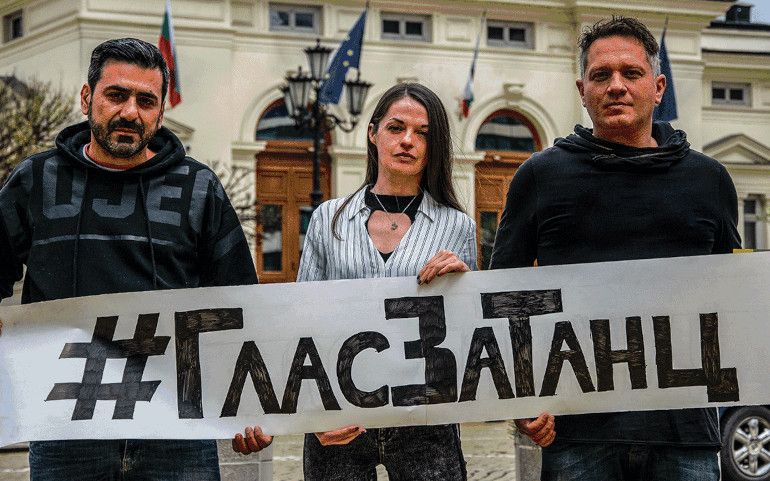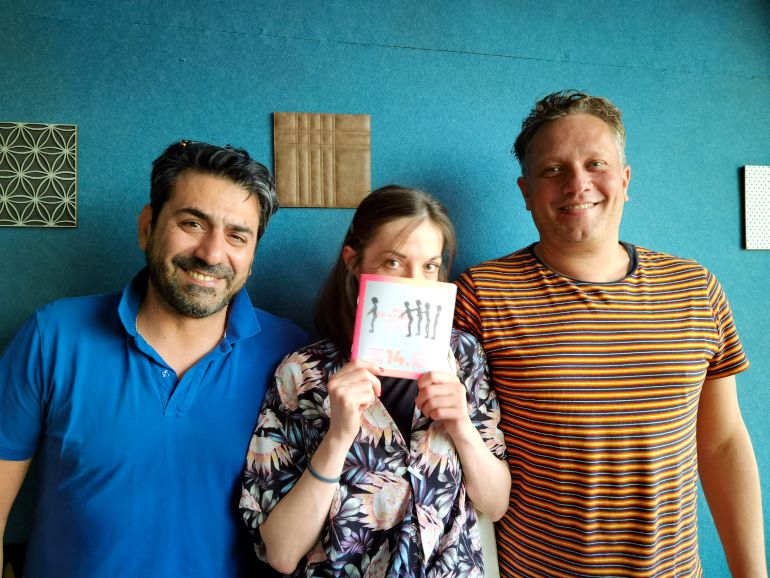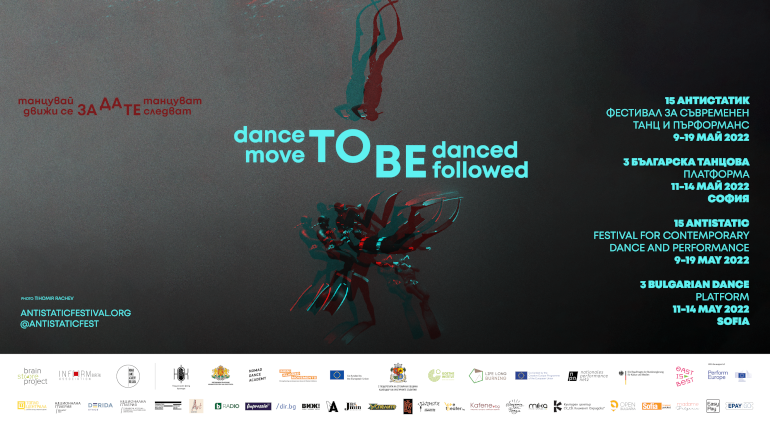Meet the founders of the festival for contemporary dance and performance
Written by Scott Green, edited by Mila Boshnakova, photos by Antistatic
The Antistatic International Festival for Contemporary Dance and Performance is returning this year for its 15th edition from 9 May until 21 May. The festival again takes place in Sofia and will present you with over 20 different events. You will be able to enjoy performances from both international performers and local Bulgarian ones, with recent works from emerging local choreographers, as well as from some of the most established ones.
The Antistatic Festival began in 2008 and is the first of its kind in Sofia. The founders of the festival are Iva Sveshtarova, Willy Prager, and Stephan A. Shtereff. Two of the founders, Iva and Willy, are often a stage duo and have been nominated for the National Icarus Award for Contemporary Dance and Performance for their latest production "Before the end...(of the world)." Stephan is most recognizable at the moment as one of the hosts of the "100% Awake" morning show on Bulgarian National Television.
Motivated by the passion to practice their art, instead of choosing to leave, these three established artists created the festival in order to pave the way for contemporary dance in Bulgaria.
What was your inspiration for starting this festival?
As Willy says, “15 years ago the main question that we were facing was: to stay or to move out of Sofia? To be separated from new trends in the performing arts or to bring them to Bulgaria.” Aren’t we all glad they stayed, Iva adds, “When we founded the festival in 2008, there were no regular events in Sofia to show international productions and/or provide a platform for presenting the local dance scene.”
The need for such a place was what kicked off the festival. It was, as Stephan recalls, “A place where Bulgarian artists could show their work. Afterwards, the need to bring over artists whom we find interesting arose. Back then we had this feeling that a lot was happening around us; we watched performances abroad but to see anything of this kind in Bulgaria was exotic. So our main inspiration was, and still is, to make Sofia and Bulgaria a visible and wanted spot on the world map.”

What do you hope to accomplish with this festival?
“Personally, I am afraid of festivals with huge ambitions and bombastic manifestos,” says Stephan. “We do not have any ambitions to 'accomplish' in particular. We just want the world of contemporary dance to have its resonance here, too. We also want Bulgarian artists to have their presence and be reflected among other artists, cultures, festivals, and audiences.”
For Iva, the festival is a mission they ‘realize’ with great zeal and aspiration. “I see Antistatic as a space that shifts plateaus. One festival, which offers ideas and thoughts, asks questions and discusses experiments with various forms, constructs and deconstructs categories and concepts.”
Struggles you've encountered in the world of dance/performance?
“Unfortunately, we still have to fight for basic things, starting from the lack of freelance artist status in Bulgaria to the still weak funding. The lack of spaces for rehearsals and performances of dance productions threatens the existence of the independent dance scene. It is sad that after all these years of struggling for existence, basic things are still missing, which makes it difficult to fully develop the creative potential of dance artists in Bulgaria”, says Iva.
Stephan offers a slightly different perspective. “Our field is very dynamic and miscellaneous, it grows quickly, writes its own rules and demolishes them just as fast. The main struggles in the field of contemporary dance in Bulgaria are comparable to the ones in our neighboring countries – the need to establish the status of the independent artists, work conditions, the possibility of creating productions, the realization and the popularization of the stage works.”
Stephan does note, however, that these are pain points that many people and organizations around the world work hard to rectify. “There are plenty of advocacy campaigns, conferences, and international networks involved in the attempt to improve all of those issues.”
What's the most positive experience dance has given you?
“The way of composing, reformulating, experimenting, and structuring, without being afraid of falling on the ground,” says Willy. Stephan says that for him, it’s when on the last day of the festival each year, “At least one person comes running to us and asks, ‘Next year again, right? WHEN?’”

Stephan A. Shtereff is an artist and producer. He holds a degree in Synthetic Stage Arts from the University of Plovdiv, he graduated from Amsterdam-Maastricht Summer University, International School of Theatre Anthropology, and Body Unlimited program of Arts Academy of Novi Sad. He was awarded the DanceWeb scholarship, and he’s actively involved in the local and international theater and dance scene, as well as cinema and television. He’s the Director of the Informbureau Association, Co-founder of Antistatic International Festival for Contemporary Dance and Performance, European Theaters’ Night, Nomad Dance Academy Bulgaria, and Toplocentrala Association.
Iva Sveshtarova is a choreographer and performer, based in Sofia. She holds a Master’s degree in Choreography and Performance from the Institute of Applied Theatre Studies in Giessen, Germany. She graduated from the experimental Theatre-Studio 4XC and Synthetic Stage Arts program of The University of Plovdiv. In 2006 she was awarded the DanceWeb Scholarship, and from 2002 to 2006 she was part of the company Acto – Instituto de Arte Dramatica, Portugal. Since 2007, she is one of the co-founders of the Brain Store Project Foundation. She has authored and co-authored the performances: A Better Life (a collaboration between Willy Prager, the German choreographer Martin Stiefermann, and the dramaturg Natalie Baudy), Shamebox (with Willy Prager, ICARUS Award 2018), Balkan Dance Reality Show (collective work with Rosa Beermann and Sonja Pregrad), and Our Last Pas de Deux (by Galina Borissova, Museum of Hygiene, Donna Clara, and Cliché.)
Willy Prager holds a Master’s degree in Solo Dance Authorship from the University of the Arts, Berlin. He graduated from the experimental Theatre-Studio 4XC and Synthetic Stage Arts program at the University of Plovdiv. He has worked with directors and choreographers such as Galina Borissova, Nikolay Georgiev, David Zambrano, Ivo Dimchev, deufert&plischke, Thomas Lehmen, Dalija Acin, Matej Kejzar, and Maren Strack, among others. He has authored and co-authored the performances: Museum of Hygiene (2011), Transformability (2012), Victory Day (2013), Balkan Dance Reality Show (2015), Our Last Pas de Deux (2015), and Shamebox (2018). In 2013, he won the Prix Jardin d’Europe Award of ImPulsTanz Festival. Willy Prager is among the co-founders of the Balkan dance network Nomad Dance Academy and the Brain Store Project Foundation.
Open Bulgaria is the official media partner of Antistatic.
Bringing forward and supporting the contemporary artistic and cultural sides of Bulgaria.
You can check out the festival calendar here, and their Facebook, and Instagram.
